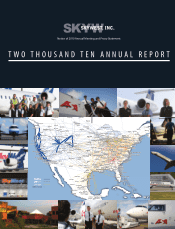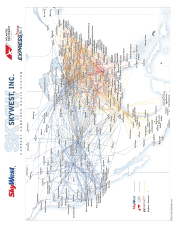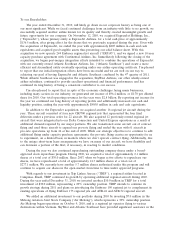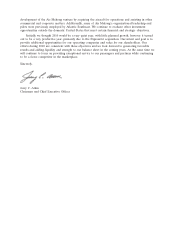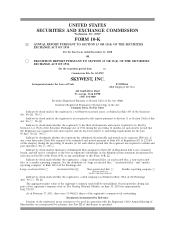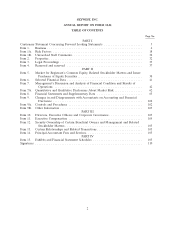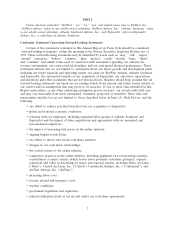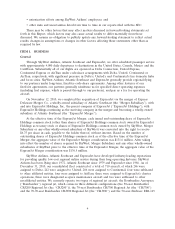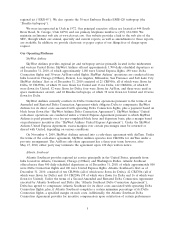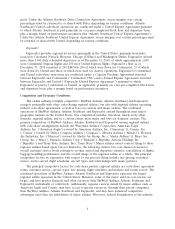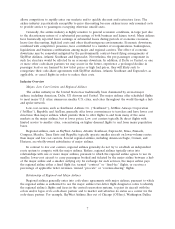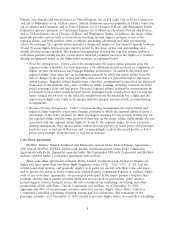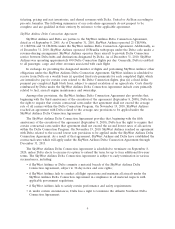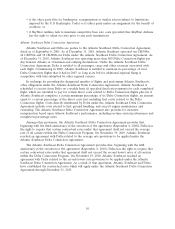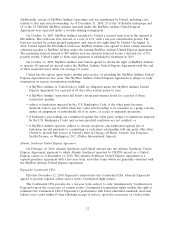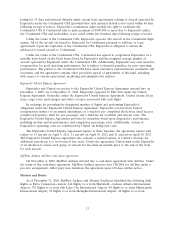SkyWest Airlines 2010 Annual Report Download - page 7
Download and view the complete annual report
Please find page 7 of the 2010 SkyWest Airlines annual report below. You can navigate through the pages in the report by either clicking on the pages listed below, or by using the keyword search tool below to find specific information within the annual report.PART I
Unless otherwise indicated, ‘‘SkyWest,’’ ‘‘we,’’ ‘‘us,’’ ‘‘our’’ and similar terms refer to SkyWest, Inc.;
‘‘SkyWest Airlines’’ refers to our wholly-owned subsidiary, SkyWest Airlines, Inc.; ‘‘Atlantic Southeast’’ refers
to our wholly-owned subsidiary, Atlantic Southeast Airlines, Inc.; and’’ExpressJet’’ refers to ExpressJet
Airlines, Inc., a subsidiary of Atlantic Southeast
Cautionary Statement Concerning Forward-Looking Statements
Certain of the statements contained in this Annual Report on Form 10-K should be considered
‘‘forward-looking statements’’ within the meaning of the Private Securities Litigation Reform Act of
1995. These forward-looking statements may be identified by words such as ‘‘may,’’ ‘‘will,’’ ‘‘expect,’’
‘‘intend,’’ ‘‘anticipate,’’ ‘‘believe,’’ ‘‘estimate,’’ ‘‘plan,’’ ‘‘project,’’ ‘‘could,’’ ‘‘should,’’ ‘‘hope,’’ ‘‘likely,’’
and ‘‘continue’’ and similar terms used in connection with statements regarding our outlook, the
revenue environment, our contractual relationships, and our anticipated financial performance. These
statements include, but are not limited to, statements about our future growth and development plans,
including our future financial and operating results, our plans for SkyWest Airlines, Atlantic Southeast
and ExpressJet, the anticipated benefits of our acquisition of ExpressJet, our objectives, expectations
and intentions and other statements that are not historical facts. Readers should keep in mind that all
forward-looking statements are based on our existing beliefs about present and future events outside of
our control and on assumptions that may prove to be incorrect. If one or more risks identified in this
Report materializes, or any other underlying assumption proves incorrect, our actual results will vary,
and may vary materially from those anticipated, estimated, projected, or intended. These risks and
uncertainties include, but are not limited to, those described below in Item 1A., Risk Factors, and the
following:
• our ability to achieve potential benefits from our acquisition of ExpressJet;
• global and national economic conditions;
• relations with our employees, including organized labor groups at Atlantic Southeast and
ExpressJet and the impact of labor negotiations and agreements with our unionized and
non-unionized employees;
• the impact of increasing fuel prices on the airline industry;
• ongoing litigation with Delta;
• our ability to attract and retain code-share partners;
• changes in our code-share relationships;
• the cyclical nature of the airline industry;
• competitive practices in the airline industry, including significant fare-restructuring activities,
consolidation of major carriers (which leaves fewer potential code-share partners), capacity
reductions and other restructurings by major and regional carriers, including Delta Air Lines
(‘‘Delta’’), United Air Lines, Inc. (‘‘United’’) Continental Airlines, Inc. (‘‘Continental’’), and
AirTran Airways, Inc. (‘‘AirTran’’);
• increasing labor costs;
• security related and insurance costs;
• weather conditions;
• government legislation and regulation;
• reduced utilization levels of our aircraft under our code-share agreements;
3

